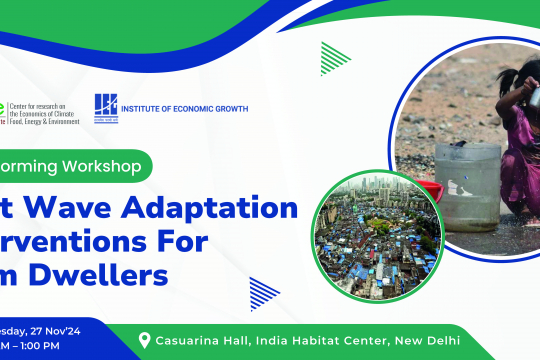Event Information
Informal workers in Delhi face large income losses and health risks from summer heat stress
Delhi is experiencing increasingly severe and prolonged heat waves, with the summer of 2024 breaking records as temperatures exceeded 49°C for 45 consecutive days. Even at night, minimum temperatures hovered around 36°C, providing little respite and causing widespread health issues. Urban areas like Delhi are especially vulnerable to these extreme temperatures. According to the Indian Meteorological Department (IMD), 37 cities across India recorded temperatures over 45°C in 2024, resulting in 41,000 heatstroke cases and 116 deaths nationwide.
Impact of heat waves on informal workers
Heat waves have significant economic consequences for impoverished slum dwellers working in the informal sector. A recent EfD India study by Saudamini Das, Professor at the Institute of Economic Growth and E. Somanathan, Professor and Head of the Centre for research on the Economics of Climate, Food, Energy, and Environment at the Indian Statistical Institute, Delhi published in the peer-reviewed journal Environmental Research Letters (2024) examined 396 slum-dwelling workers from two slums in Delhi over a month during the peak heat of May-June 2019. The study revealed significant economic losses and health impacts due to high temperatures.
Income loss: A 1°C rise in maximum temperature results in a 14% drop in net earnings, while a 1°C increase in wet bulb temperature—an indicator that combines heat and humidity— reduces net income by 19%. During the two heat waves that occurred in the study period, workers’ earnings were 40% lower than on the other days.
Increased expenditure: As temperatures rise, expenditures on essentials such as medicine, ice, and water, surge with medical costs increasing by 14.4% per degree rise in temperature.
Health impacts: Workers face serious health consequences, including sleep loss of 16%–22%, leading to fatigue and absenteeism. The primary reason for missing work was heat-related illness, not the lack of available work.
Policy implications: This study highlights the urgent need for policies to protect informal workers from the severe impacts of extreme heat, which are expected to intensify with climate change. Based on the findings of the study, the following measures are recommended:
- Income support: Introduce income protection programs or wage subsidies to buffer the significant wage losses informal workers suffer during heat waves.
- Health and safety measures: Provide access to affordable healthcare and essential supplies like water and ice to help workers manage the health risks during high-temperature periods.
- Workplace modifications: Set up cooling centers or shaded areas for outdoor workers to reduce their exposure to dangerous temperatures.
